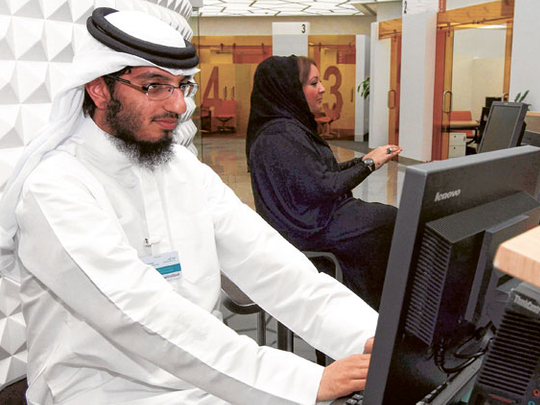
Last week a landmark decision was issued by President His Highness Shaikh Khalifa Bin Zayed Al Nahyan to set up the Khalifa Fund for Emiratisation Empowerment (KFEE) to support the emiratisation drive in the private sector.
The fund will be set up with support from the government, which will finance programmes to recruit Emiratis in private establishments.
The move is a qualitative leap in Gulf recruitment programmes and is an efficient contribution to resolving issues related to job opportunities, which will have significant economic and social consequences, especially when creating jobs for citizens has become an issue of interest to all GCC countries.
New impetus
In the past two decades, GCC countries have witnessed many changes and shifts in their economic structure with the shifting of gravity once again towards the private sector.
The private sector saw quick growth in the past few decades. Earlier, the public sector had dominated economic activities as the flow of oil revenue had attracted most of the manpower in the Gulf region due to large expansion in infrastructure and the services sector.
But it was the private sector which made the most of huge government investments in the infrastructure sector, which allowed the rapid development of local and foreign private sector investments at low and supported service prices. This requires the private sector to respond positively to government approaches towards increasing employment in this sector, especially after the public sector had become saturated with extra employees.
Nevertheless, the current approaches differ from the previous emiratisation policy, which relied on replacing the expatriate workforce with GCC manpower. That approach achieved limited results due to the nature of professions and jobs suitable for the GCC workforce being at variance with those suited for expatriate employees.
The current approach aims at creating job opportunities that suit the GCC work culture, which also needs to be developed. The private sector has many job opportunities that are suitable for Emiratis.
Growth rate issues
However, the starting salary and privileges do not suit the needs of Gulf youth but can be supported during the first years through government programmes, such as the Khalifa empowerment programme. Increasing the number of Emirati workers in the private sector does not necessarily have to be by replacing expatriate employees but by creating new jobs produced by the continuous growth of the private sector. As things stand, providing more jobs is mainly linked to growth rates and economic expansion. In Qatar, for example, the local economy achieved huge growth rates in 2010 — estimated to be 16 per cent. In January and February 2011, 784 Qatari citizens were employed, out of which 71 per cent (557) were in the private sector, and 29 per cent (227) in the government sector.
In the UAE, however, KFEE will achieve positive results quicker and contribute to solving many job market-related issues, such as qualifying Emiratis and providing thousands of job opportunities for them in the private sector.
Therefore, this will result in Emiratis getting more involved in the productive process. Working in the private sector will provide them with a richer work experience after working in the public sector, which offers employment in only a limited number of sectors.
The Khalifa empowerment programme has established necessary and important foundations for this qualitative leap in the local job market. However, this important approach requires the cooperation of the local and foreign private sector, which is offered all possible means of success by the country through high-end services and various facilities.
This obliges the sector to ensure the success of this approach. Moreover, Emiratis are required to respond to this approach and bear with the difficulties they might face during the early phase of their work, especially when they will reap the fruits from this approach by gaining experience that cannot be acquired anywhere else except by working in the private sector. As a result, this gives Emiratis an ideal opportunity to improve their work and living conditions.
Prospects for region
Given the social and economic significance of the Khalifa Empowerment fund, this experiment can be exported and eventually include all GCC countries.
This can be achieved through coordination with the Ministry of Labour and could contribute to solving some job market and demographic issues that are shared by the GCC countries.
Dr Mohammad Al Asoomi is a UAE economic expert.












